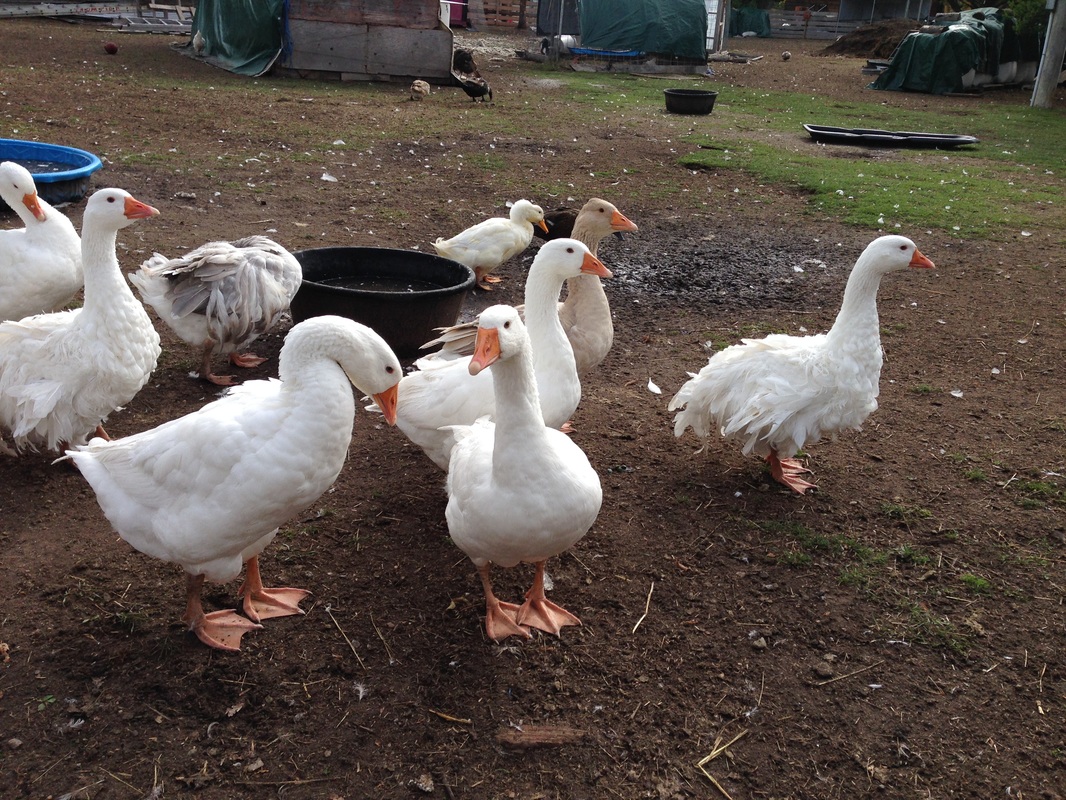For example, this morning I was up at 6 am, then went out to catch chickens and stuff them in the canopy of the truck with the turkeys, ducks and geese that wre put in the night before. The chickens were quite easy to catch in comparison with the large birds. To catch them, I built a makeshift pen and the birds were herded into it, with feed there waiting for them, and once in, a flexible wire panel was pulled quickly around them trapping them in the pen. Then I simply had to pick the birds up and hand them over to Travis who put them in the canopy for me. Still, picking up a large goose is not easy. Geese and turkeys that run around outside all day and use their muscles are extremely agile and strong. The large white Danish geese with blue eyes all went bye bye, but the lovely rare Sebastpols and their offspring of different colours, actually crosses with the tufted Toulouse cross gander, got to stay. Pairs of the ducks, one male and one female were kept with the exception of the Blue Swedish and Rouens. I kept about 6 Rouen ducks, 5 ducks and one drake and only one drake of the Blue Swedish. I meant to send him off, but he was overlooked for some reason. I will try to find a home for him and the Khaki Campbell pairs, white and Khaki. Those Khaki Campbells dress out at only a couple of pounds and their pin feathers do not come out easy, so they are not a good seller.
Actually, none of the birds are good sellers. For some crazy reason I thought folks would want farm raised birds, running around all summer dining on grass and bugs with grain supplements, but not here. They just want the fat, big sloth birds that are caged and do not move and grow like Frakenstien so they can be butchered in 5 weeks. Gross! And their eggs do not sell for a fair price of $5 a dozen, so I do not sell them either. Hence the heavy cull. Why keep birds, that cost a lot to feed and take time to care for, if the eggs and birds, live or frozen simply do not sell? The Sebastopol geese might be a good seller, but that will remain to be seen. In the USA the coloured Sebastopol geese sell for as much as $300 and are kept as lawn ornaments and pets because they are so beautiful. Mine are also wonderfully tempered, so would indeed be good pets. Geese are social and intelligent and love to converse. We chatter back and forth to each other every day and they will come right up to me and talk to me. So, they got to stay.
I do plan to cut down the chickens as well and should have taken more in to butcher, but I was catching alone and trying to load them in the canopy without losing any of the birds already there, so only loaded the roosters, except one and two nasty hens that peck the other girls, or did. I have another dozen chickens to butcher, but there are twenty some chicks either just hatched or already feathered, which will grow up over winter. Oy. Less hens will mean less eggs, which is fine ,since I cannot keep up to what is gathered every day anyhow, and less chicks, so less birds to butcher.
The 55 birds cost 6 hours of driving time, there and back twice, once to deliver and once to pick up, 4-6 months of being fed, and believe me, large birds like turkeys and geese eat a lot, and then, are you ready for this? $455.85 to have the birds butchered. Yup, folks, four hundred and fifty five dollars and eighty five cents! I cannot possibly eat 55 big birds this winter. They will keep frozen for up to three good years. I will give some away and definitely cook a lot of them, but I have a feeling that the dogs will get their share when they get old and freezer burned and that is such a pity and expense.
Lesson learned. Birds are out. In this area they do not work. I refuse to get the meat birds that grow so quickly they cannot sustain their own lives and they often keel over and die. I refuse to feed animals foods containing gmo's either so force feeding in small pens is out. And since from now on, it is for me only, no more guests at the bed and breakfast, and the occasional friends or family, about 5 or 6 ducks and maybe 10 chickens, maybe less, is all I need. I am not sure what to do when the birds reproduce at such a rapid rate as they have been doing. I will try to sell the chicks and ducklings and have been able to do so sometimes, but not always. Then what? break their necks?OMG break the neck of a baby duckling???? NO. Can't and won't be doing that. I gues the rest of the story will be written after the next year trying to cut down and stay with low numbers. Time will tell.
Roast goose for Thanksgiving anyone? Duck? Turkey? Maybe a black skinned chicken?


 RSS Feed
RSS Feed